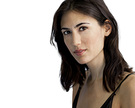An Interview With Narrator. Caroline Kessler
It is my pleasure to introduce Ms. Caroline Kessler, the wonderful voice behind my first audio book. Caroline's audition was amazing, and she sounds exactly like the Everly Gray that resides in my mind.
Caroline is an actor/ writer/ photographer/ video editor/ filmmaker in New York. (She's a gemini, obviously.) Her short film, "CONQUESTS" won the Special Jury Prize for Best Emerging Filmmaker. When she has to do responsible things, like earn her keep and feed her cats, she edits commercials for Sam Adams beer. But she would almost always rather be taking pictures or dancing tango.
And now, here's Caroline!
How did you get interested in doing voice-overs?
Honestly, I'd always thought of the voice over industry as fascinating, but far too hard to break into. I had done a little bit here and there, had a few "you should do voice-overs!" through the years, but found the process of trying to pull together a reel and find representation rather daunting. It's hard enough to get those things done as an actor. When ACX provided the chance to audition directly for an author, it seemed time to give it a go. While acting and voice over work appear to go hand-in-hand, they are two completely different professions with different requirements and different skill sets. I think being an actor helped me make the transition, but there has certainly been a learning curve.
What kind of voice training do you have, or is it something that you developed naturally?
I am a classically-trained actor. I have had voice and speech classes at the regional theater where I grew up, with the Royal Shakespeare Company's vocal coach, and just about everywhere in between! It's a pretty big part of any actor's training: how do you use your voice to fill this theater's space? With voice over, it is much the same techniques, but now instead of having to fill a character and a theater space, I can concentrate almost exclusively on character. It's a lot more like film that way; there's the room to be subtle. But, unlike film, there's no visual to fill in moments of muddied diction--so articulation is a main concern.
When you sit down to narrate, how do you get yourself in the mindset to do all those voices? How hard is it for you to switch from a male voice, to a female voice in one sitting?
I often start to hear a character's voice during a first read. It has a lot to do with the character herself; I don't feel like I make all that many decisions. The writer is the creator, and ultimately I am trying to breathe life into these individuals whom she knows far more intimately than I. So I always begin with the writer's intent (same for theater or film acting--the words are the thing.) Then I start to make more specific decisions based on what I understand of the character, maybe consider who I would cast in the film version of the story and why. In the case of "To Touch a Thief," I heard Everly as a quirkier version of myself, Jane I instantly recognized as a character from a tv show I used to love to hate (to love), Mitch reminded me of a boy from college, and Parker had to be able to seduce anything and anyone. This is how characters begins to grow, and take on lives of their own. Suddenly I know how they would act in various situations, and it all flows very naturally. In the best of circumstances, the writer feels like I have both understood his characters, and elevated them to even greater life.
When it comes to recording, I have a rather practical trick: I underline each character's dialogue in a dedicated color, so I know visually in advance if a shift is coming up.
Your voice is obviously quite valuable. Is there anything special that you need to do to protect it, such as voice exercise or days of rest?
I'll do some vocal exercieses before I begin, and keep water or warm tea nearby--but I have found the most important trick is to take breaks. If I begin to get tired (and continuously speaking is surprisingly exhausting), I'm going to jumble words no matter how hard I try. I do find myself being a little quieter after a long recording session, though not to preserve my vocal chords--merely because I'm tired of the sound of my own voice!
You work as an actor, a filmmaker, and a video editor. Do all of these skills help with voiceover?
I work as the voice talent and as the producer on my ACX titles, which means I'm responsible for performing, recording, editing, and mastering the final product. I think it is the perfect marriage of my acting and editing interests. For me it's a matter of pride, and really a fulfilling experience, to know the audio has been in my hands from start to finish. My time, energy, and care is in every part of those recordings.
What drew you to audition for this particular book?
My love of reading absolutely stems from my sixth-grade English teacher introducing me to Agatha Christie. I was crazy about mysteries, and my mom could hardly keep up with the trips to the mall bookstore required to keep me busy. I think mysteries are wonderful examples of some of the most engaging storytelling. This project takes me right back to that early joy of literature. And Everly is delightful!
Caroline is an actor/ writer/ photographer/ video editor/ filmmaker in New York. (She's a gemini, obviously.) Her short film, "CONQUESTS" won the Special Jury Prize for Best Emerging Filmmaker. When she has to do responsible things, like earn her keep and feed her cats, she edits commercials for Sam Adams beer. But she would almost always rather be taking pictures or dancing tango.
And now, here's Caroline!
How did you get interested in doing voice-overs?
Honestly, I'd always thought of the voice over industry as fascinating, but far too hard to break into. I had done a little bit here and there, had a few "you should do voice-overs!" through the years, but found the process of trying to pull together a reel and find representation rather daunting. It's hard enough to get those things done as an actor. When ACX provided the chance to audition directly for an author, it seemed time to give it a go. While acting and voice over work appear to go hand-in-hand, they are two completely different professions with different requirements and different skill sets. I think being an actor helped me make the transition, but there has certainly been a learning curve.
What kind of voice training do you have, or is it something that you developed naturally?
I am a classically-trained actor. I have had voice and speech classes at the regional theater where I grew up, with the Royal Shakespeare Company's vocal coach, and just about everywhere in between! It's a pretty big part of any actor's training: how do you use your voice to fill this theater's space? With voice over, it is much the same techniques, but now instead of having to fill a character and a theater space, I can concentrate almost exclusively on character. It's a lot more like film that way; there's the room to be subtle. But, unlike film, there's no visual to fill in moments of muddied diction--so articulation is a main concern.
When you sit down to narrate, how do you get yourself in the mindset to do all those voices? How hard is it for you to switch from a male voice, to a female voice in one sitting?
I often start to hear a character's voice during a first read. It has a lot to do with the character herself; I don't feel like I make all that many decisions. The writer is the creator, and ultimately I am trying to breathe life into these individuals whom she knows far more intimately than I. So I always begin with the writer's intent (same for theater or film acting--the words are the thing.) Then I start to make more specific decisions based on what I understand of the character, maybe consider who I would cast in the film version of the story and why. In the case of "To Touch a Thief," I heard Everly as a quirkier version of myself, Jane I instantly recognized as a character from a tv show I used to love to hate (to love), Mitch reminded me of a boy from college, and Parker had to be able to seduce anything and anyone. This is how characters begins to grow, and take on lives of their own. Suddenly I know how they would act in various situations, and it all flows very naturally. In the best of circumstances, the writer feels like I have both understood his characters, and elevated them to even greater life.
When it comes to recording, I have a rather practical trick: I underline each character's dialogue in a dedicated color, so I know visually in advance if a shift is coming up.
Your voice is obviously quite valuable. Is there anything special that you need to do to protect it, such as voice exercise or days of rest?
I'll do some vocal exercieses before I begin, and keep water or warm tea nearby--but I have found the most important trick is to take breaks. If I begin to get tired (and continuously speaking is surprisingly exhausting), I'm going to jumble words no matter how hard I try. I do find myself being a little quieter after a long recording session, though not to preserve my vocal chords--merely because I'm tired of the sound of my own voice!
You work as an actor, a filmmaker, and a video editor. Do all of these skills help with voiceover?
I work as the voice talent and as the producer on my ACX titles, which means I'm responsible for performing, recording, editing, and mastering the final product. I think it is the perfect marriage of my acting and editing interests. For me it's a matter of pride, and really a fulfilling experience, to know the audio has been in my hands from start to finish. My time, energy, and care is in every part of those recordings.
What drew you to audition for this particular book?
My love of reading absolutely stems from my sixth-grade English teacher introducing me to Agatha Christie. I was crazy about mysteries, and my mom could hardly keep up with the trips to the mall bookstore required to keep me busy. I think mysteries are wonderful examples of some of the most engaging storytelling. This project takes me right back to that early joy of literature. And Everly is delightful!



 RSS Feed
RSS Feed
